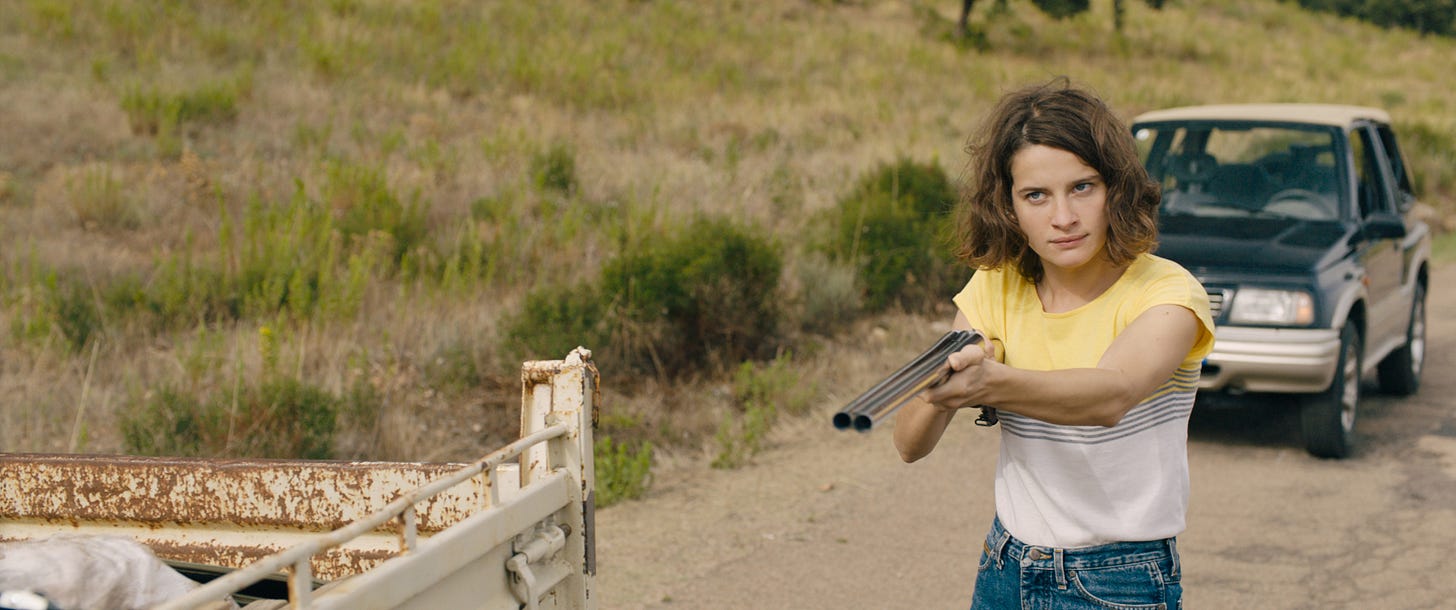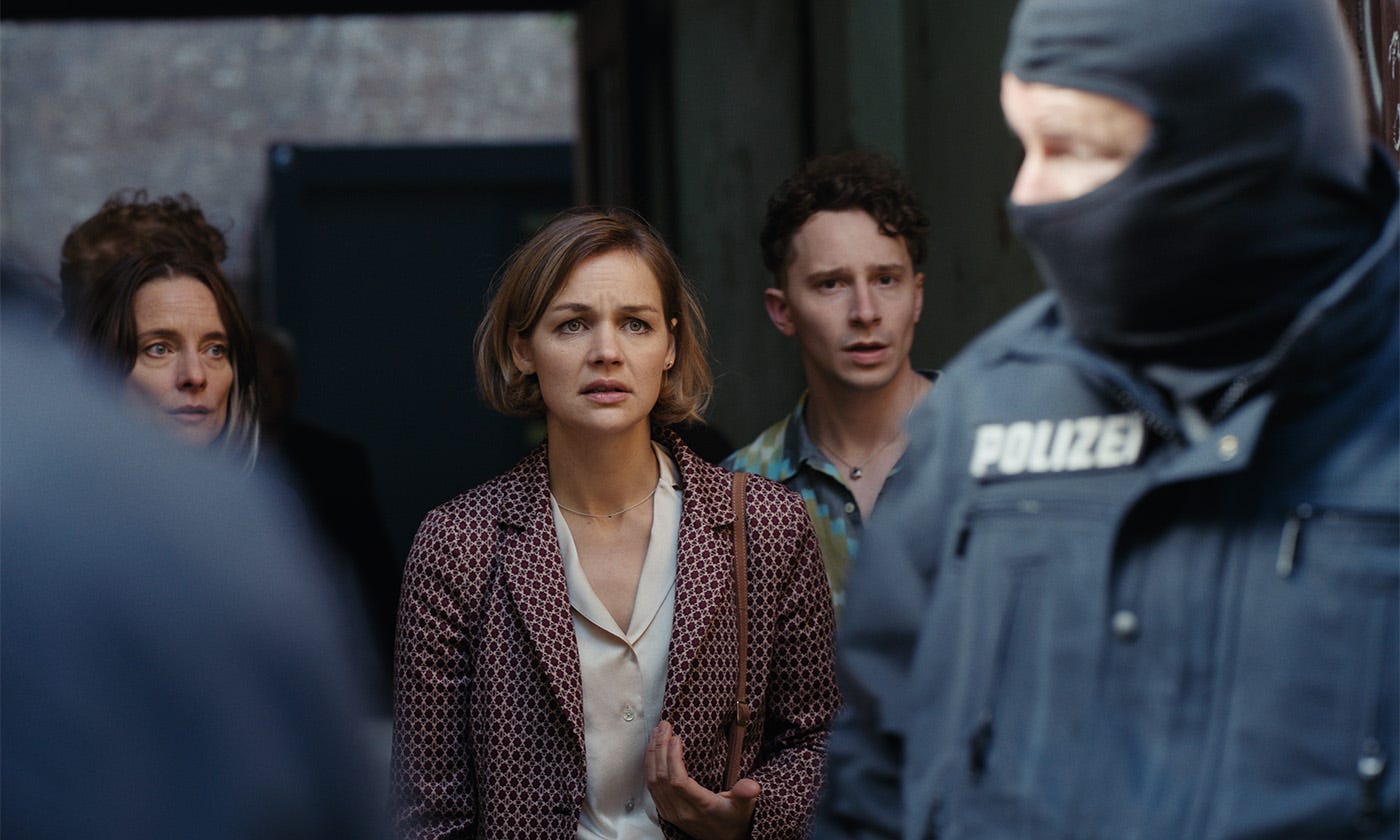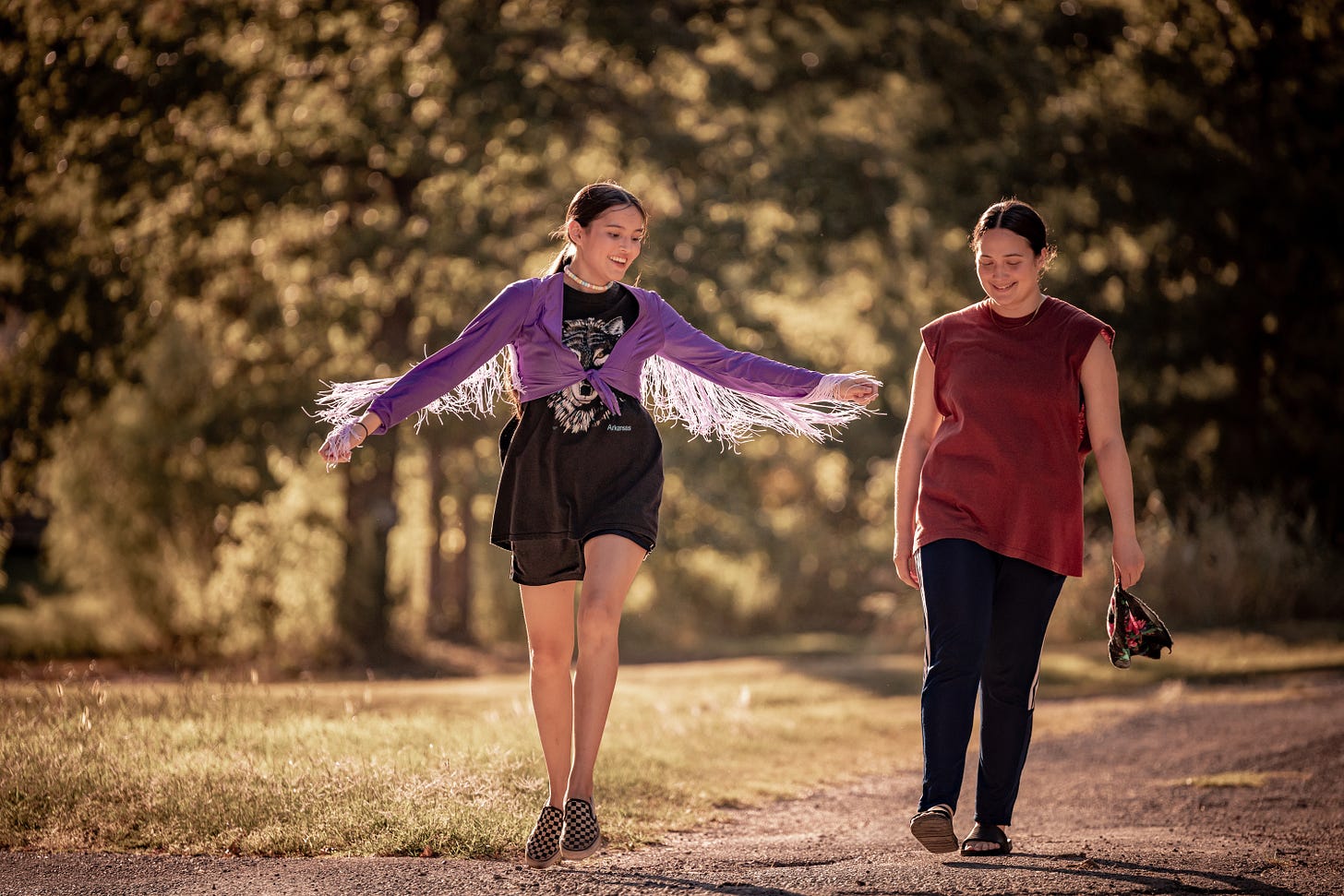Munich Filmfest (2023) Reviews Part One, Weekly Reel #55
Grand Expectations, Black Box, Fancy Dance, The Padilla Affair, Edge of Everything, Band, Club Zero, The Return from the Other Planet, God’s Creatures, and Dry
News of the Week: I watched twenty nine feature-length films at the Munich Filmfest; therefore, I have plenty to review. These three Weekly Reel posts will feature many more films than usual, with shorter reviews accordingly. Because most of these films are traveling the festival circuit, they can’t be recommended literally in Watch Now, so those films will sit in the Save for Later section, which for these films, and only these MFF posts, means that they’re worth watching as soon as they’re available. Enjoy, I love you.
**There will be a standalone festival, treveloguesque post about the festival coming later**
Save for Later
Grand Expectations (2022, Sylvain Desclous, France) is a very French film: love, left-wing politics, familial disputes, nudity, and a naughty Corsican. This is the third feature film of Sylvain Desclous, a political science and law student turned film writer-director. His previous films covered working class politics and electoral politics, both in fiction and documentary formats. Grand Expectations brings these issues together along with murder, as it concerns a young woman’s consequences following a disastrous vacation in Corsica.
Madeleine, played by the film’s standout up-and-comer Rebecca Marder, a uni-student studying for her final exams with left-wing socio-political aspirations, on vacation with her boyfriend Antoine (Benjamin Lavernhe, who is also the real-life partner of Marder), murders a Corsican man, “accidentally” through self-defense, after a road-rage incident. They hide the rifle and don’t report the shooting. The next morning, two policemen question Madeleine and Antoine, who claim ignorance to a reported shooting nearby. The couple shares this secret, which unites them until they go back home, but Antoine can’t shake the guilt and darts.
Madeleine needs to face the situation on her own. She confesses the murder to her estranged father out of desperation, who takes the news surprisingly well—perhaps he’s just glad to have his daughter back? But her life begins to unravel over time as unintended events leads her to a lucrative political job for a leading French political figure, who was also a visitor at that vacation home in Corsica and the author of a bill Madeleine wrote her thesis on. The narrative starts to get tense when Antoine unexpectedly shows up again, months later, who’s now not on Madeleine’s side; after all, she’s the woman who shot Corsican man.
The name of the film, Grand Expectations, in its original French: De grandes espérances, immediately brings Great Expectations to the English mind. But the Dickens novel, in French, is Les grandes espérances; a pesky variance that reveals, to me, an interesting difference. The Dickens novel uses a definite article, direct and specific, but general. The film uses an indefinite article, the ambiguous reference to something unspecified or some—from one to near infinity—amount of something. Considering Desclous revealed that the film is not an adaptation of Pip’s great three-stage journey of expectations, no need to compare the plot. But while Dickens unfolds the specific story directly about Pip, which is generalized into a cautionary tale by the plot’s disillusionment end, Desclous’s story is more ambiguous, the murder plot constantly shifting and unsettling the world around Madeleine, which concludes sans cautionary tale, good triumphing over evil morality, etc.
Whatever the case may be, we root for Madeleine and her work towards getting French industrialists to sell their factories to its workers. The film doesn’t pander to left-wing politics and brilliantly disguises the plot around the most cinematic construction of all time: murder. The unreality of it works well in the film’s story world, which isn’t always perfect but holds up the façade. In the end, Madeleine’s “Great Expectations” is also France’s, especially concerning the killing of a Corsican after he specifically called them out for vacationing in his home and disrespecting his hometown’s roadways. The disillusionment is realizing the French can get away with it.
Black Box (2023, Asli Özge, Germany/Belgium) is true to its name. The film unfolds in a (sorry but I must use the cliché because not using it would be worse) Kafkaesque mystery; residents are stuck in the courtyard of their Berlin apartment complex, blocked in by the police without any details expect with the citing of some ambiguous emergency—an ironic irenicism if you will. The multicultural residents form a synecdoche of German/Berlin life that helps Istanbul-born writer-director Asli Özge explore aspects of German society on the personal-human level. Black Box is Özge’s second feature-length film set in Germany that continues her interest in hyper-focusing on the lives of a small group of people beset by all the typical follies of humanity.
Black Box uses the Kafka plot to render the societal treatment of immigrants and foreigners. When the lockdown begins and develops, it’s the non-Germans (and non-German-passing foreigners) who are immediately targeted. We follow most of the drama through Henrike (Luise Heyer), a young German mother failing to go to her first job interview since taking an extended maternity leave. One of the more sympathetic members of the trapped lot, Henrike is quickly utilized against her own interests for the socio-political cause of others. The most prominent character is Johannes (Felix Kramer), a real-estate broker who crane-lifted his black office cell into the apartment courtyard the previous day. Although an outsider to the residents, he’s the main point of contact with the police—the first ominous sign.
Although the first and second acts drag towards the climax, the subtle breakdown of society reveals a lot of nuances: Johannes is quietly attempting to corral residents into agreeing for a complete re-building, some of whom agree; a man from Dagestan, who’s afraid his leftist banners against Russian occupation will implicate him in a property damage case from a previous rally, is thought to be from Afghanistan and suspected because of his shady movements from one apartment to another; in another building, a young Lebanese woman, confused as an Iranian, is targeted because of her relationship with the man from Dagestan, who has trouble explaining herself linguistically to the Germans; a random, ambiguously middle eastern man is found dead in the attic; even the coffee shop, a staple of Berlin cuisine, is threatened into becoming an art gallery. Most of these events, of which there are plenty, unfold quietly and through suspicious whispers of confusion, adding to the dread and ignorance of their prison-like position in the first place.
While the description of the film makes it sound like “The Monsters Are Due on Maple Street” episode of Twilight Zone, it doesn’t resort to the immediate breakdown in relations that leads to indiscriminate violence. The terror comes from the entirely legal and scary process Johannes controls over the entire apartment complex, who holds an ambiguous Mephistopheles position from beginning to end. If the spirit of Make Germany Great Again existed in Berlin, he would be its archangel.
Black Box will be released in Germany on August 10.
Save for (a bit) Later
Fancy Dance (2023, Erica Tremblay, USA) is a vehicle for Lily Gladstone, Queen of mansuetude, and a rare opportunity for the Seneca-Cayuga Reservation to show off its location shoots. Jax (Gladstone) is looking for her sister, who recently disappeared, while taking care of her niece Roki, now recently orphaned. The pair is introduced through light-hearted criminal misdemeanors. The plot hinges on Jax tirelessly inquiring, because the police/FBI are good for nothing, while maintaining Roki’s hopes for a mother-daughter dance at the upcoming powwow.
Gladstone’s acting abilities will soon be internationally recognizable with Scorsese’s film; she can make every gesture and pause, like Brendan Fraser, an acting class in and of itself. Her performance is enhanced through the trial she’s put through; discrimination and poverty that eventually takes her off the reservation that may or may not land her back home. The film makes quick work in answering questions about what it means to be family, both communally and personally.
The Padilla Affair (2022, Pavel Giroud, Spain/Cuba) is a documentary about poet-writer Herberto Padilla’s self-criticism in front of the Cuban Writers’ Guild after his arrest in 1971. Though the revolution broke out twelve years prior, Cuban writers enjoyed a degree of free expression unseen in other Communist countries. Padilla, among others, began writing poems, books, and essays not explicitly flattering to the state. In private, they would air starker grievances. Padilla was the first of these writers arrested and released, which directly led to his denunciation of his own convictions and pledging a new state allegiance.
Where the story becomes interesting is Padilla fingering the others who had expressed reservations in the past, live, in front of everyone at the meeting. (Cameras were rolling, and this documentary is the first time the public has glimpsed the affair.) Thereafter began a period of self-criticism among Cuban writers that effectively ended their freedom of expression, subtly and largely through self-censorship. The documentary plays out like an academic texts with footnotes as Padilla mentions something new; for instance, the revolution and Castro, other writers, his own books, etc.
Edge of Everything (2023, Pablo Feldman and Sophia Sabella, USA) is a teen-age girl bildungsroman set in suburban America starring Sierra Mccormick, T.V. show regular getting her chance to lead a film. Her performance in The Vast of Night showed potential, but Edge of Everything let her prove her staying power. In it, she plays a soon-to-be fifteen year-old, who begins slowly reveling in drugs and alcohol with a girl outside her regular squad. Her mother passed away and her father is marrying a yoga instructor, neither showing great interest in establishing a connection that will get her out of the house in three years. But we’re not fully on Mccormick’s side at first, who only becomes our sympathetic character after outside threats from older (negative) influences. In the directing duo’s feature-length debut, they mostly play it safe—bordering on conservative—regarding the climax. But that doesn’t matter as much as Mccormick’s brilliant performance.
Band (2022, Álfrún Örnólfsdóttir, Iceland) is a documentary posing as a fiction, as the director and real life band member said. Her band, three women in Iceland playing experimental shows with older beats made by a previous bandmate, is struggling to survive the literal gig economy. The band is each of their second or possibly third-most important money-making endeavor. They play tiny bars and clubs around town as well as the odd estate opening show. The film, which features everyone playing themselves unfolding in real time, is oftentimes funny in the way This is Spinal Tap captures the other side of show business, mixed in with the hilarious incongruously juxtaposed edits. Their band comes under threat when they hire a fourth member who can produce music, but he’s a he. On top of that, Álfrún books a giant venue in Reykjavík but has no marketing infrastructure to fill the room. Will they survive, will they thrive? That doesn’t matter as much as the journey they take, which, as the director said, is about their struggles having meaning in the first place.
Pass
Club Zero (2023, Jessica Hausner, Austria/UK/Germany/France/Denmark) is another Hausner-drycringe film, this time about a cult-like Mia Wasikowska starting a conscious-eating class at an ambiguously neon-coloured élite private school. The program, which develops into a religion professing a zero-intake food diet, captures five of the pupils and they climax in bliss. Some people might like the central Metaphor—faith—of the film being obvious and the actual plot as well, but I don’t. It left nothing under the surface, besides from a tepid takedown of these “conscious—” trends and faux-environmentalism of the one-percent and what it may do to our children. I did like the “EAT THE DAMN SAUSAGE” line and puke-eating scene. There’s no real drama and is an obvious breakdown in order that we could see with complimentary telescopes passed out in the lobby. The students aren’t well fleshed out; not much to really care about. Sidse Babett Knudsen as the principal was the only person who tried to be funny (and succeeded).
The Return from the Other Planet (2023, Assaf Lapid, Germany/Israel) isn’t a good film to watch in the AM. This documentary covers Ka-Tzetnik, a Jewish author who survived Auschwitz and then spent his career writing about it. For many Israelis, these stories were the first time they grappled with those horrors, which he wrote presently vivid. One of the high points comes halfway through when he fasts before providing testimony against Eichmann; he begins hallucinating when trying to describe the concentration camp, then passes out. His story ends when he goes to the Netherlands for experimental LSD treatment to combat the intense PTSD, which was exacerbated by the trial—previously, his two identities, Ka-Tzetnik the writer and Yehiel De-Nur the person, were mutually exclusive. The documentary is serviceable and informational but will be flooded out by the many other Holocaust docs and films. Like the more recent All Quiet on the Western Front, The Return from the Other Planet offers nothing new and relies on “the horror of it all.” Not to mention the horrendously rendered CGI, which does that horror an uncanny disservice.
God’s Creatures (2022, Saela Davis and Anna Rose Holmer, Ireland/UK/USA) is, which brings me no great pleasure to write, a not great Paul Mescal film. His moody fisherman character, combined with Emily Watson’s always-good acting, sustains fifty percent of the film, but nothing brings up the other half. The drama is decent, emotions and tensions lurking under the water until it finally catches its prey in the end. The characters can’t properly express their feelings to each other, which is the Irish stereotype, but is better suited for a comedic-adjacent drama like The Banshees of Inisherin than a straightforward depiction.
Dry (2022, Paolo Virzì, Italy) is a mess. Less substance than an actual desert. A bunch of Italian people thirsty for ninety-seven minutes. Don’t know what else to say. It’s the Italian cousin of Magnolia; or more specifically its Pagliacci-Benigni buffoon jester. Not as cringe with its Metaphor as Don’t Look Up, but said equally as little about actual climate change or its effects on interpersonal relationships and society in general.
Thank you once again for checking out my Substack. Hit the like button and use the share button to share this across social media. And don’t forget to subscribe if you haven’t already done so.







